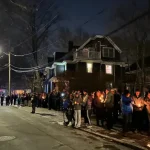
The US criticized Israel’s recent decision to allow Jewish settlers to establish a settlement around the West Bank Hamesh outpost area, despite Washington previously urging Tel Aviv not to legitimatize the outpost.
Last week, the chief of the Israeli military’s Central Command, Yehuda Fuchs, signed a decree allowing Israelis to enter the Homesh area, which would essentially pave the way for constructing another settlement in the occupied West Bank. Under international law, Israel’s settlement expansion into the Palestinian territories is deemed illegal.
The US State Department has consistently demanded that Israel refrain from making escalatory moves against the Palestinians, which in this case, would assure further confrontations between the Israeli military and Palestinian resistance.

State Department Spokesperson, Matthew Miller, remarked that the US is apprehensive over Israel’s decision to legitimize the outpost in the northern occupied West Bank, as its construction would be considered illegal.
We are deeply troubled by the Israeli government’s order that allows its citizens to establish a permanent presence in the Homesh outpost in the northern West Bank, which according to Israeli law was illegally built on private Palestinian land. This order is inconsistent with both former Prime Minister Sharon’s written commitment to the Bush Administration in 2004 and the current Israeli government’s commitments to the Biden Administration. Advancing Israeli settlements in the West Bank is an obstacle to the achievement of a two-state solution.
We are also concerned by today’s provocative visit to the Temple Mount/Haram al Sharif in Jerusalem and the accompanying inflammatory rhetoric. This holy space should not be used for political purposes, and we call on all parties to respect its sanctity... — US State Dept
According to a Hebrew media report last month, the Israeli Knesset has passed its third reading of a bill that would lift the ban on settlers returning to four settlements in the occupied West Bank, including Homesh, Sa-Nur, Ganim, and Kadim.
These previous settlements were evacuated under the ‘disengagement’ law in 2005, which saw the withdrawal of Israeli troops from the Gaza Strip and the evacuation of several settlements in Gaza and the northern occupied West Bank. Israeli lawmakers proposed this new legislation to reestablish the four settlements in December last year.
"Death to Arabs"
— Ashok Swain (@ashoswai) May 19, 2023
“A Jew is a soul, an Arab is the son of a whore"
“May your village burn down”
These were the slogans & songs of far right Jewish marchers marching through Muslims Quarter in Jerusalem with state protection!
pic.twitter.com/NwGZFYEffH
In January, Israel’s High Court gave Benjamin Netanyahu’s government 90 days to explain its reasons for not dismantling the Homesh settlement in accordance with the Disengagement Law. The government had already been planning to repeal segments of the law as part of a plan to legalize the settlements, including the Homesh outpost.
Israeli news outlet Haaretz suggested in April that the judicial overhaul policy was the Israeli far-right’s response and “revenge” to the 2005 Disengagement Law.
The US criticized Israel’s recent decision to allow Jewish settlers to establish a settlement around the West Bank Hamesh outpost area, despite Washington previously urging Tel Aviv not to legitimatize the outpost.
Last week, the chief of the Israeli military’s Central Command, Yehuda Fuchs, signed a decree allowing Israelis to enter the Homesh area, which would essentially pave the way for constructing another settlement in the occupied West Bank. Under international law, Israel’s settlement expansion into the Palestinian territories is deemed illegal.
The US State Department has consistently demanded that Israel refrain from making escalatory moves against the Palestinians, which in this case, would assure further confrontations between the Israeli military and Palestinian resistance.

State Department Spokesperson, Matthew Miller, remarked that the US is apprehensive over Israel’s decision to legitimize the outpost in the northern occupied West Bank, as its construction would be considered illegal.
We are deeply troubled by the Israeli government’s order that allows its citizens to establish a permanent presence in the Homesh outpost in the northern West Bank, which according to Israeli law was illegally built on private Palestinian land. This order is inconsistent with both former Prime Minister Sharon’s written commitment to the Bush Administration in 2004 and the current Israeli government’s commitments to the Biden Administration. Advancing Israeli settlements in the West Bank is an obstacle to the achievement of a two-state solution.
We are also concerned by today’s provocative visit to the Temple Mount/Haram al Sharif in Jerusalem and the accompanying inflammatory rhetoric. This holy space should not be used for political purposes, and we call on all parties to respect its sanctity… — US State Dept
According to a Hebrew media report last month, the Israeli Knesset has passed its third reading of a bill that would lift the ban on settlers returning to four settlements in the occupied West Bank, including Homesh, Sa-Nur, Ganim, and Kadim.
These previous settlements were evacuated under the ‘disengagement’ law in 2005, which saw the withdrawal of Israeli troops from the Gaza Strip and the evacuation of several settlements in Gaza and the northern occupied West Bank. Israeli lawmakers proposed this new legislation to reestablish the four settlements in December last year.
“Death to Arabs”
“A Jew is a soul, an Arab is the son of a whore”
“May your village burn down”
These were the slogans & songs of far right Jewish marchers marching through Muslims Quarter in Jerusalem with state protection!— Ashok Swain (@ashoswai) May 19, 2023
In January, Israel’s High Court gave Benjamin Netanyahu’s government 90 days to explain its reasons for not dismantling the Homesh settlement in accordance with the Disengagement Law. The government had already been planning to repeal segments of the law as part of a plan to legalize the settlements, including the Homesh outpost.
Israeli news outlet Haaretz suggested in April that the judicial overhaul policy was the Israeli far-right’s response and “revenge” to the 2005 Disengagement Law.
Loading…





